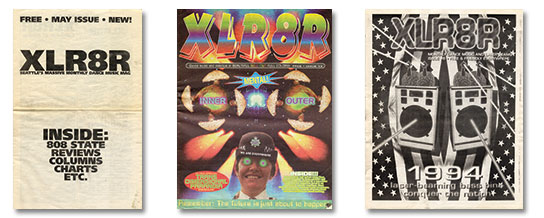PLURed Vision: 15 Years of XLR8R
From our early days of printing off of floppy discs at a Seattle Kinko’s to […]

PLURed Vision: 15 Years of XLR8R
From our early days of printing off of floppy discs at a Seattle Kinko’s to […]

From our early days of printing off of floppy discs at a Seattle Kinko’s to navigating the online-publishing revolution, XLR8R has tried to keep it as real and as DIY as possible. For the occasion of our 15-year anniversary, we editors decided to throw our boss a few questions about how we got here.
XLR8R: Describe the cultural climate from which XLR8R emerged.
Andrew Smith: Seattle in 1993 was on the downslope of grunge hype. It still had a lot of local flavor but it was starting to self-destruct because of the mainstream record deals that were getting signed. It had a good club culture–a lot of gay clubs that had been around for a long time–but it was a very small scene that hadn’t changed since the late ’70s/early ’80s. When rave culture came along, it was a trainwreck of rock ’n’ roll people, ’80s club people (that felt like they should be holders of the holy grail of 4/4 music), and then all of these kids–from drug dealers to DJs to really bad graffiti artists–who all decided to get together and throw a rave.
No hippie burn-outs?
They were more like meth-addicted hippies. There was a lot of influence from California; the rave promoters down there threw parties up in Seattle with the same names. They brought up their DJs, like the Hardkiss Brothers. It was kind of like California was the filter for the U.K. scene (many artists moved from the U.K. to San Francisco and L.A.) and then we got a further-removed version from the California interpretation.
So how did XLR8R start?
I was the arts editor of the University of Washington Daily. I would take the newspaper car with a gaggle of photographers and we’d be at a rave ’til like 4 in the morning, doing this “special” on raves. We had an awesome time; a total abuse of resources. That was towards the end of my tenure as the editor, and by that point I had been introduced to all the promoters, knew all the DJs locally. For a while, the newspaper let me do XLR8R out of their offices, because I was paying them for the supplies and everything. But when the board of regents found out about it, they had to pull the plug and it moved to Kinko’s.
There was some sort of philosophy behind it for you, right?
It got me really excited when I became a member of the rave community. There was the do-it-yourself aspect: a lot of young, motivated people creating businesses, producing things–the sorts of things you aren’t really supposed to do until you’re older or more experienced, but here they were just going for it. But I was also intoxicated with how illegal it was. The parties were illegal, the drugs were–and still are–illegal, the record releases were illegal (white labels with complete rip-offs of samples). It was the complete subculture; completely subverting the popular culture was a big part of what I was excited about–and still am.
How would XLR8R be different if it started today?
One of the greatest things you can do with any kind of media enterprise is go cross-platform: print, online, XLR8R TV. So I think if we started it now, it would first and foremost be a website and TV show, with the ability to leverage print expertise, events, and other stuff like that.
What might you tell someone trying to start such a venture today?
Regardless of the medium, they have to ask themself, how hard are they willing to work? You’ve got to be willing to sacrifice your life; it becomes your life. That’s the only way you’re going to start something out of nothing. Also, have your own innovative approach. If you’re gonna start something online, you need to stand out: Is it your editorial voice that stands out? Your graphic design? The functionality of what it is that you’re creating? You’ve got to continually drive forward with new ideas and new ways of presenting your ideas. You can lock onto something that’s successful and you can nail that niche, but if you don’t continue to advance then you’re not gonna last for that long.
Audio Interview
Listen to Ken Taylor’s full interview with Andrew Smith.

